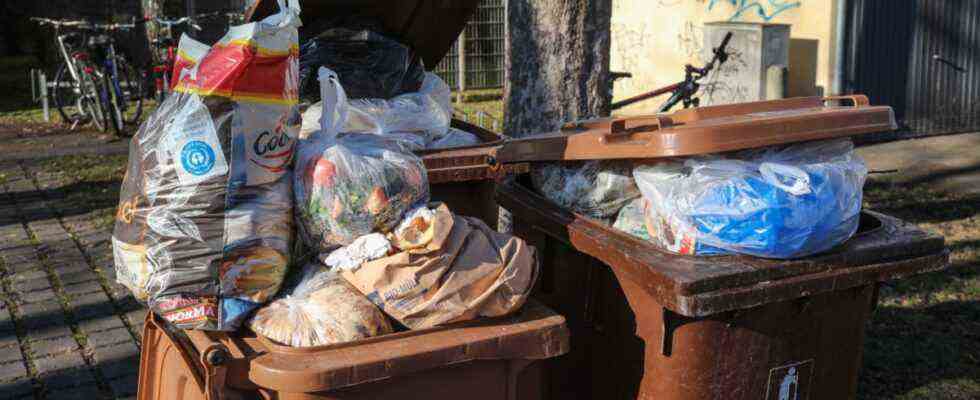Garbage piles up at the recycling points in the district of Dachau in particular at Christmas and New Year’s Eve. According to the district office, around 85 tons more residual waste accumulates during the Christmas season. Even weeks later, the familiar picture emerges: glass bottles, boxes, rubbish bags or paper carrier bags are simply dumped next to the containers at the local recycling points, then the rubbish offenders drive away in the car and the matter is settled for them. Other people, on the other hand, bring some absurd or even dangerous waste to the containers. More and more cities, such as Ebersberg, are therefore sending out mobile teams to track down rubbish offenders.
This is currently out of the question for the district of Dachau, explains the press spokeswoman for the district office Sina Török: “Waste management is currently working on a campaign to bring the importance of separation closer to the citizens. Instead of control, we would rather focus on education.”
The pandemic has exacerbated the waste problem
The corona pandemic has contributed to the mountains of rubbish growing across Germany. According to the Federal Statistical Office, the volume of waste from private households increased significantly in the first Corona year 2020: “The per capita volume of household waste rose from 457 to 476 kilograms” – i.e. by 19 kilograms. Overall, there were increases in all types of waste, especially recyclable materials such as paper, cardboard and plastic waste as well as organic waste. Compared to 2019, the amount of household waste increased by four percent in 2020. Figures for 2021 are not yet available.
The amount of residual waste has also increased in the Dachau region, explains Barbara Mühlbauer-Talbi from the district’s waste management department: “This is probably due to the fact that we spend more time at home, some are starting to renovate and this creates rubble, for example. Others start at home to clean up.” As a result, more residual waste is produced, as the figures show: in 2019, every citizen of the district caused 124.9 kilograms of it, in 2020 it was already 131.3 kilograms. With around 154,913 inhabitants in the district, this results in around 20,300 tons of residual waste per year.
Incidentally, residual waste and bulky waste from the district is disposed of in the Geiselbullach waste-to-energy plant. During combustion, energy is obtained, which in turn is used to generate district heating and electricity.
And how is waste separation going in the district’s private households? The district office reports: “In single-family houses and in rural areas, the separation usually works very well, residential complexes are problematic, the separation usually doesn’t work well here.” Barbara Mühlbauer-Talbi suspects: “There is probably more anonymity in the residential complexes. Some of the garbage is not separated at all and everything is simply thrown together with the residual waste.” Which garbage sinner is behind it, can usually not be understood.
If you are unsure about separating waste, you can get tips from waste management
Another source of error is organic waste: “Some pack their organic waste in plastic sacks or bioplastic bags,” says Mühlbauer-Talbi. But even the latter rot very slowly: “And in the further processed compost there are microplastics that end up in our earth.” Mühlbauer-Talbi recommends disposing of organic waste in paper bags or wrapping it in newspaper. Another tip: If you are unsure about separating waste, you can download a waste separation list with pictures from the district office’s website.
Mühlbauer-Talbi appeals to the citizens who dump their rubbish next to the recycling containers: “When the container is full, you should simply drive to another recycling center or one.” There was sharp criticism for this proposal in a Facebook post by the district office at the end of December. Users complained that the containers in the district were emptied too seldom and they didn’t want to drive their garbage around. One user wrote: “You shouldn’t just scold the citizen, but check whether the containers have really been emptied, because it often seems like they haven’t been emptied for two weeks or the intervals just have to be increased.” Another Facebook user criticized: “Rarely seen so few glass containers as in the Dachau district.”
District Administrator Stefan Löwl (CSU) answered this personally: “The expansion of the container capacities often fails due to a lack of expansion space for additional collection containers, I’m happy to accept concrete suggestions – if possible coordinated with the property owner and the city/municipality. A shortening of the collection intervals is at regular overcrowding conceivable.”
So far, however, the garbage chaos at the recycling islands has arisen again and again. Mühlbauer-Talbi sometimes also observes bizarre things: “Some take advantage of the situation and, for example, put an old sofa next to the container” – in order to save on bulky waste costs, Mühlbauer-Talbi suspects.

